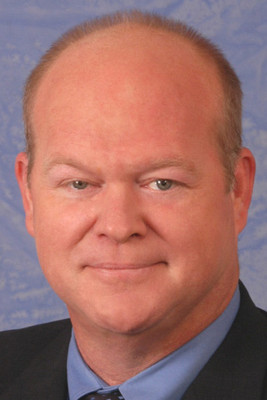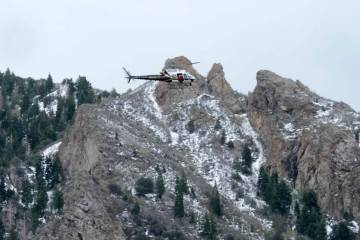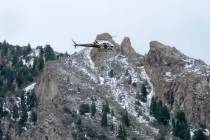Almost half the states facing budget shortfalls
CARSON CITY -- If misery loves company, then Nevada, struggling with revenue shortfalls and budget cuts, is just one member in a very big club. From Arizona and California to Alabama and Maine, nearly half of the states are reporting or anticipating budget shortfalls next year.
The housing slump is getting its share of the blame for next fiscal year's shortfalls, estimated at a minimum of $23 billion in 13 states, including Nevada, according to an analysis by the Washington, D.C.-based Center on Budget and Policy Priorities.
An additional 11 states are reporting likely budget problems next year or the year after, according to the nonprofit, nonpartisan center.
Nevada, which approves budgets two years at a time, is also facing a shortfall on projected revenues this fiscal year, which began July 1.
A separate analysis issued by the National Conference of State Legislatures reports that 24 states have been hurt by the housing slump and that the states' fiscal picture could get worse if there is a national recession.
"If the economy takes a turn for the worse, state finances undoubtedly will decline from the situation reported here," the report says.
Nevada is facing a $450 million shortfall over two years, or about 6.6 percent of the total $6.8 billion general fund budget, according to the latest estimates.
Sen. Bob Beers, R-Las Vegas, said the findings corroborate what many already knew -- that Nevada is not unique in dealing with budget and revenue issues.
The collapse of the residential real estate boom may have been more pronounced in Nevada because of a higher level of speculation by investors here than in many other states, he said.
"This might have made the statistical reporting of our real estate fall slightly more spectacular than in some other states," Beers said.
But Nevada does seem to be in a stronger position because it has not relied on gimmicks to balance its budget, as some other states have done, he said.
"Some states seem to have started doing what the federal government is doing, taking on debt to fund salaries and operating costs," Beers said.
State Budget Director Andrew Clinger said Nevada has been conservative in its approach to budgeting, which puts the state in a better position to deal with lower-than-expected revenues.
"We haven't used one-time funds to balance the budget and we've done a pretty good job of bolstering our rainy day fund," he said.
But Clinger agrees that if the country goes into a recession the revenue picture could worsen for Nevada and many other states.
"The gaming industry has weathered the slump pretty well so far," he said. "But it is definitely something to be cautious about. If a slowdown starts to affect the gaming sector it will make it a lot worse for us."
Although the collapse of the housing market and its effect on sales tax revenues is seen as a big factor in the state budget problems, the report by Elizabeth McNichol and Iris Lav for the Center on Budget and Policy Priorities finds other causes as well.
Some states, such as Florida and Michigan, have enacted tax reductions that are proving to be unaffordable.
Others, including Alabama, Arizona and California, according to the report, are dealing with a structural budget imbalance where revenues grow more slowly than the cost of providing state services.
Others, including Connecticut and New Jersey, have revenue issues as a result of using one-time funds, including surpluses, to pay for tax cuts or increased spending.
Nevada is not included in these three categories, but it is one of the top states with budget problems where structural deficits are identified as a contributing factor.
A separate report by the center identifies 10 factors contributing to structural deficits where revenue does not keep up with spending, including the super majority requirement to raise taxes, which the center said hampers the ability of lawmakers to modernize tax codes. The shift in the national economy from the production of goods to services, which are often not taxed, as well as the growth in Internet sales where taxes are often not paid, are two other factors that apply to Nevada.
The center reports that 12 of the states currently facing fiscal problems -- Alabama, Arizona, California, Florida, Kentucky, Michigan, Missouri, Nevada, Oklahoma, Rhode Island, South Carolina, Texas, and Virginia -- have at least seven of the 10 identified risk factors and so are at highest risk of a structural deficit.
Assemblywoman Sheila Leslie, D-Reno, a member of the Assembly Ways and Means Committee, said Nevada belongs in the category of states with a high risk of a structural deficit in part because of its over-reliance on sales and gaming taxes, which make up the majority of the state's tax revenue.
"I think our budget gap fits into that section the best because sales/gaming tax revenue is cyclical and difficult to predict and leads us to these sharp downturns every few years," she said.
Leslie said Nevada's revenue structure is a very shaky foundation on which to build a two-year budget. The result is a cycle where the state has a $300 million surplus one time and a $500 million hole the next.
There is a growing call for a more stable tax revenue structure, she said.
"If we don't seriously confront this problem, we will continue to see a disintegration of our communities and businesses will stop relocating here, tourists will avoid us and our residents will suffer greatly," Leslie said.
The center report said the effect of the revenue shortfalls could mean cuts in education and health programs unless state legislatures opt to raise taxes instead.
Nevada Gov. Jim Gibbons had made his position clear: He will not support new taxes as part of a solution to any state revenue shortfall.
And Beers, a member of the Senate Finance Committee, said any suggestion that tax increases are a solution to revenue problems is shortsighted.
A conservative analysis of the payroll tax collections in Nevada for the first quarter of the fiscal year suggests that somewhere between $300 million and $500 million in wages anticipated to be earned did not materialize for Nevada workers, Beers said. So average Nevadans are already suffering from the current economic conditions.
"It doesn't make sense to now raise taxes and increase the hardship on people," he said.
Nevada's gaming revenues are projected to be on target for the current budget. But sales and other revenues with a connection to the slumping housing market are another matter.
The NCSL report found that at least 12 states are seeing declines in their real estate transfer taxes, including Nevada, because of the housing slump.
The Center on Budget and Policy Priorities reports that the collapse of the housing market has hurt taxable sales as well because of lower demand for furniture, appliances, construction materials and related products.
Real estate transfer and sales tax collections are both contributing to Nevada's revenue problems. For the first quarter of the 2007-08 fiscal year, real estate transfer taxes in Nevada came in $6 million lower than what was projected by state officials. Sales tax collections for Nevada were off by $24 million below the forecasted amount for the same period.
Officials expected to make up $284 million of the state shortfall through cuts to operating budgets. The rest will be made up from the state's rainy day fund and the delay of construction projects or other one-time expenditures.
The Center on Budget and Policy Priorities report does not suggest that all the other states are doing OK. Rather, many have just not updated their fiscal reports for the coming year.
But some states are doing better than others, according to the report. Some states, including New Mexico, Montana and Wyoming, are seeing revenue growth as a result of higher oil prices.
And some other regions' economies are less affected by the national economic problems, according to the report. For example, states with high levels of exports are benefiting from the falling value of the dollar.























